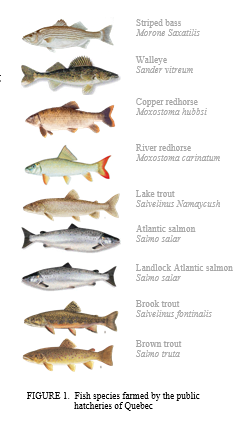FROM ATLANTIC SALMON TO STRIPED BASS CULTIVATION: INSIGHTS FROM A CONSERVATION AND FISHERIES MANAGEMENT PERSPECTIVE
The province of Québec cumulates more than 140 years of restocking and expertise aimed at wild indigenous salmonid species such as the anadromous Atlantic salmon (Salmo salar). Annually, between 500 000 and 1 000 000 fishes are produced by Quebec public hatcheries to support recreational fishing and restore wild freshwater fish populations of nine species (Figure 1). Recently, large-scale re-introduction efforts through artificial breeding plans were initiated for walleye (Sander vitreum), striped bass (Morone saxatilis) and an endemic catostomid, the copper redhorse (Moxostoma hubbsi) for which a severe decline in its abundance and its distribution range has been documented.
Located in southern Quebec, the Baldwin-Coaticook public hatchery is a major playor in intensive cold and coolwater fish production activities from broodfish conditioning to ongrowing purposes with its 12 state-of-the-art independent rearing systems. Successful yearly fingerlings production was achieved through the accelerated establishment of reproduction and natural rearing protocols. Significant contributions to the rebuilding of these populations are already observed in the wild.
Developing unique expertise and dealing with important intensive production challenges arising from our exclusive wild-caught broodstocks, the development of natural rearing protocols, the use of recirculating aquaculture technologies and the environmental regulations make Quebec public hatcheries contributing significantly in recovery action plans that have diversified and yield important incomes. Wishing to extend our facilities and expertise over the coming years, opportunities for further research and development partnerships will be sought and promoted
